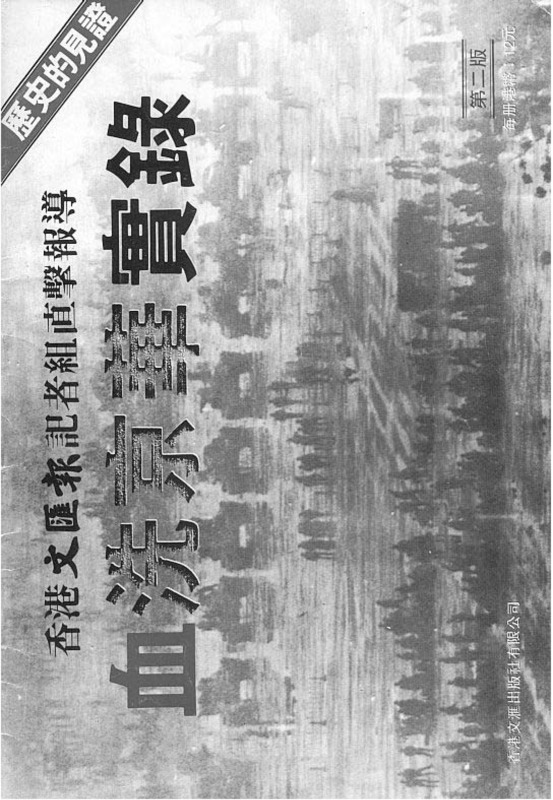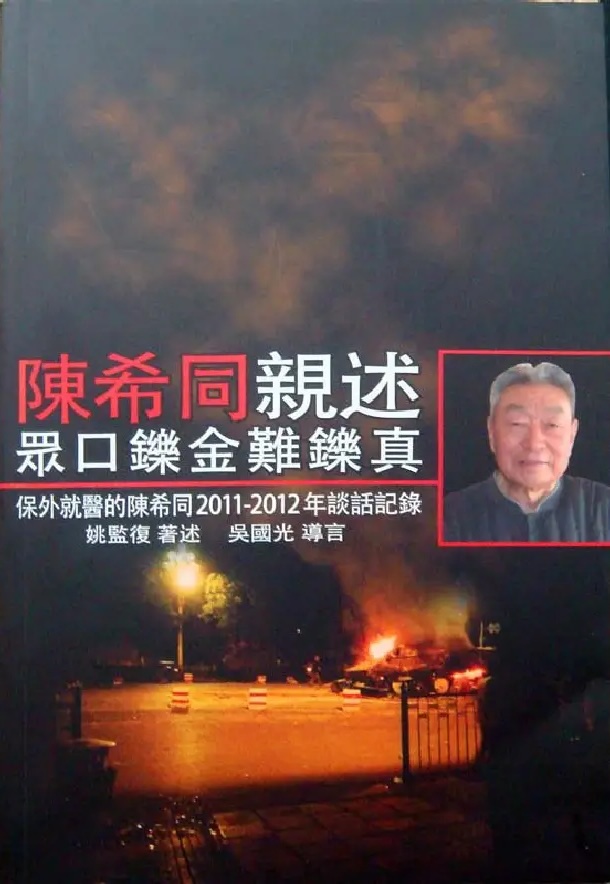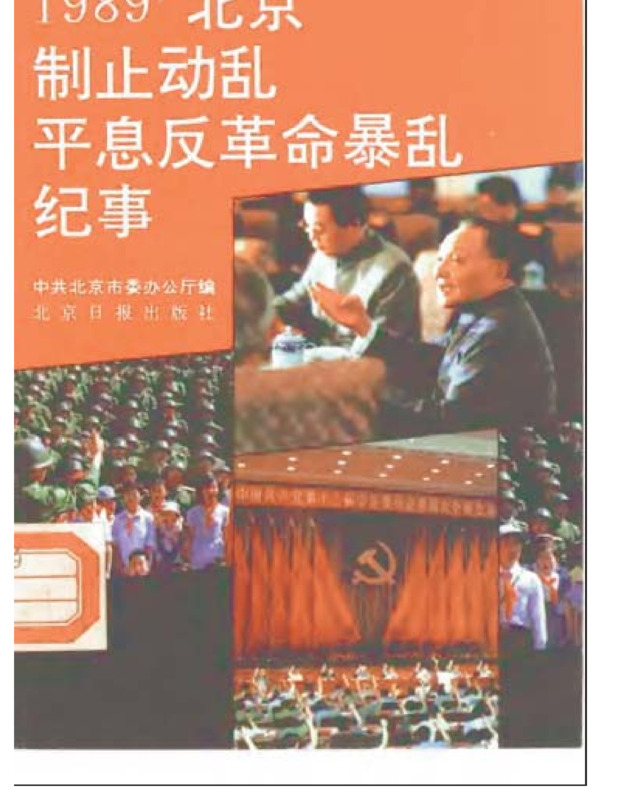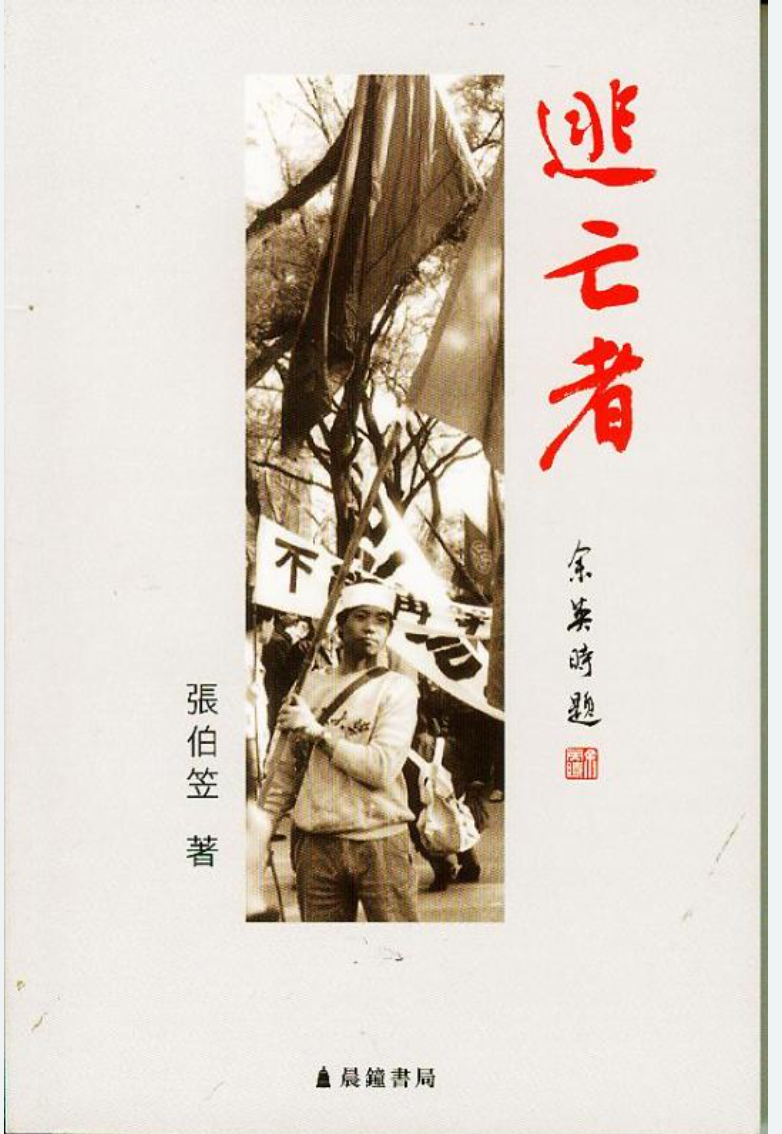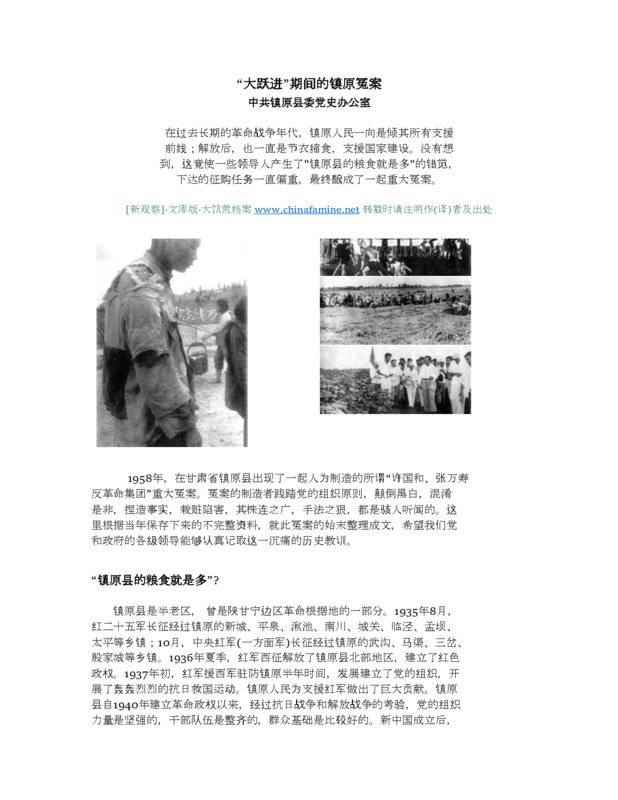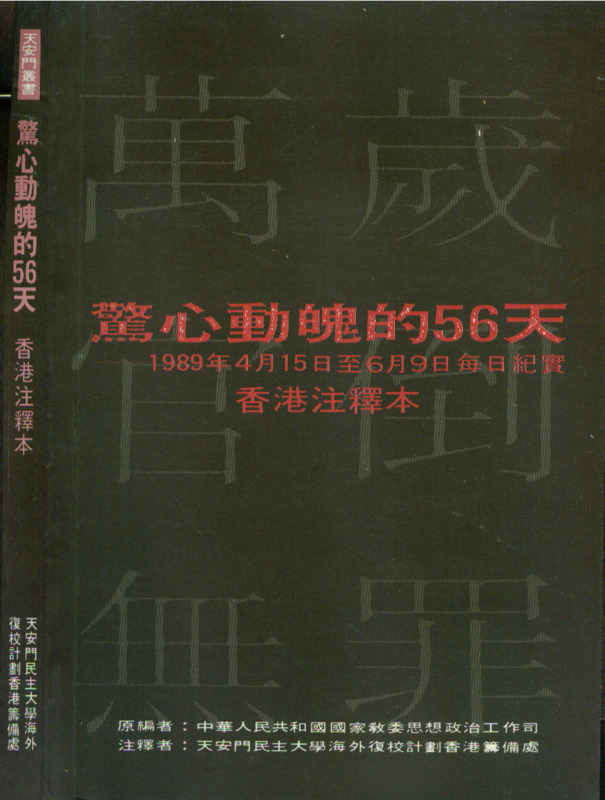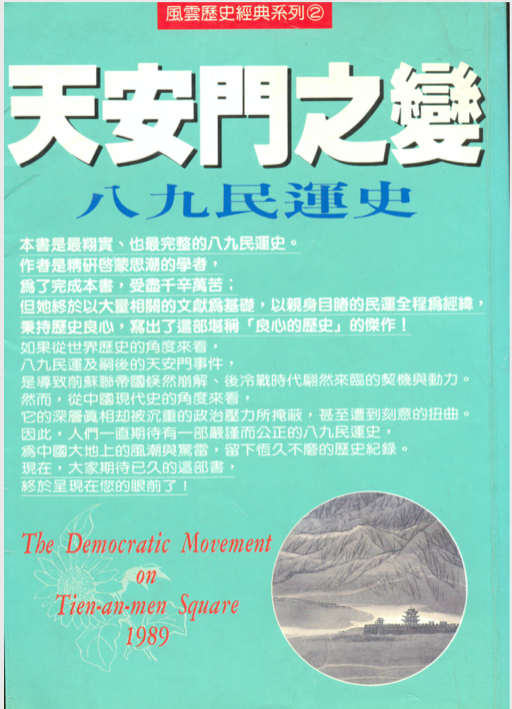Explore the collection
Showing 53 items in the collection
53 items
Book
A Non-governmental White Paper on the June Fourth Massacre
At the turn of the spring and summer of 1989, democratic protests broke out in Beijing and other cities in China. In the early hours of June 4, the Chinese government dispatched troops to suppress the movement. In 2009, on the occasion of the 20th anniversary of the June 4th Incident in 2009, some participants in the movement jointly released the "Unofficial White Paper on the June 4th Incident". The book has 48 pages and a large number of illustrations.
This white paper attempts to provide a complete political background and legal analysis of the events based on reports from Chinese newspapers, radio and television stations at the time, as well as memoirs and interviews that have been published over the past 20 years. Participants in this book believe that the Chinese government has not conducted a comprehensive investigation and objective evaluation of the June 4th Incident, and has long blocked relevant information and prohibited private investigation and discussion of the matter. The report is called a "white paper" to emphasize its rigor and normative nature.
Participants in this book include Hu Ping, Yan Jiaqi, Wang Juntao, Wang Dan, Yang Jianli and others. The book was written by Li Jinjin, a doctor of law.
Book
Bloodshed in Beijing and China: Hong Kong Wen Wei Bao 1989 Special Edition
During the pro-democracy movement in 1989, Hong Kong journalists gathered in Beijing, including Wen Wei Bao"" reporters. This book is a special issue of *Wen Wei Bao* for 1989. It contains a large number of photographs, all taken by its reporters. "After the June 4 massacre, the Communist Party of China (CCP) settled scores with the editorial team of Hong Kong's "Wen Wei Bao," replacing the president, editor-in-chief, and deputy editors-in-chief. The editor-in-chief at the time, Jin Yaoru, later moved to the United States and publicly announced his resignation from the party.
Film and Video
Care and Love
This film records the story of Liu Xianhong, a woman from rural Xingtai, Hebei, who contracted AIDS through a blood transfusion in the hospital and decided to publicly disclose her identity and sue the hospital. After fighting in the courts, she finally received compensation. This documentary demonstrates the surging awareness of civil rights in rural China at the grassroot level through depicting the experiences of several families and the concerted efforts of patients to form “care” groups to collectively defend their civil rights. Due to public awareness, media intervention, and legal aid, the government also introduced new policies to improve the situations of patients and their families.
This film is in Chinese with both English and Chinese subtitles.
Book
Chen Xitong's Personal Account - It's Hard to Fuse the Truth with All the Words
The book is a transcript of conversations between Yao Jianfu, a well-known Chinese scholar, and Chen Xitong, who was released on medical parole between 2010 and 2012. Chen Xitong was the mayor of Beijing during the 1989 student movement and was considered one of the main suppressors of the movement. In 1998, Chen was sentenced to 16 years in prison on charges of "embezzlement." In 2004, he was released on medical parole. In this book, Chen Xitong tells his version of the June 4 Tiananmen massacre. He denies not only that he was the head of the "June 4 Martial Law Command" and also claims he is innocent of the charge corruption.
Book
China on the Edge: The Crisis of Ecology and Development
Published in China in 1989, this book caused a sensation, reportedly selling as many as 300,000 copies. Described as the first "descriptive study" of the reality of China. In order to raise national awareness of the need for environmental protection, it examines the agricultural, environmental, and resource problems that China was likely to encounter in the course of modernization and predicts that the future would likely be even worse. The book was banned immediately after publication.
Book
Chronicle of the 1989 Counter-Revolutionary Rebellion in Beijing
Published in 1989 by the Beijing Daily News, this book is the Chinese government's official account and presentation of the June Fourth Incident. Officially, it describes the June 4 Incident as an upheaval and even stigmatizes it as a counter-revolutionary riot. Some of the accounts presented here need to be judged against other sources.
Official Documents
Declassified Files of the Canadian Government on the June Fourth Incident
This document, declassified in January 2015, contains a 1989 diplomatic memorandum from the Canadian Embassy in Beijing. It describes the circumstances surrounding the June 4 massacre as they were known to officials at the Canadian embassy.
The documents, declassified by the National Library and Archives of Canada, show the Canadian government's concern about the invasion of the embassy by Chinese troops. The documents also describe the crackdown in Beijing and how the troops killed citizens.
Book
Escape From China: The Long Journey from Tiananmen to Freedom
Author Zhang Boli, a former student leader of the June 4 Democracy Movement, was ranked 17th on the "21 Most Wanted List." After June 4, Zhang Boli went into hiding in his hometown in Northeast China and crossed the border into the Soviet Union, where he was detained and repatriated by the Soviets. The Soviets did not hand him over to the Chinese border guards, but let him leave on his own. In the two years following June 4, Zhang Boli was the only June 4 pro-democracy leader who was neither captured by the Chinese Communist Party nor able to flee China. It was not until 1991 that Zhang Boli arrived in Hong Kong through secret channels and applied for political asylum at the U.S. Consulate. *Escape From China:The Long Journey from Tiananmen to Freedom* was published and translated into many languages. The English version won the Washington Post's "Best Book Award".
Periodicals
Examination of the Great Famine of the 1960s in China
This book documents the situation of people during the Great Famine, reflects on the causes of this tragedy, and candidly criticizes the practices of the time, which ignored the laws of the economy and put class struggle above all else. As a *de facto* party organ, Lanzhou Municipal Political Consultative Conference’s publication of this book bears special significance.
This book is the 22nd volume of a 23-volume series called the "Lanzhou Literary and Historical Materials" compiled by the Literary and Historical Materials and Study Committee of the Lanzhou Municipal Political Consultative Conference, a body directly under CCP control.
Taking Gansu, Qinghai and Henan Province as examples, the book describes the situation of people during the Great Famine and analyzes the causes of the disaster; it also documents a series of phenomena at that time, such as the irrational construction of mega hydraulic projects, the operation of communal canteens that caused huge waste, and the mass exodus of people fleeing the famine. In chapters 10 to 15, the book summarizes the lessons learned in detail, pointing out that the Anti-Rightist Campaign and the Great Leap Forward led to the tragedy of the Great Famine.
Published in 2002, the book was edited by Wu Wenjun Wang Jialuo. Wu Wenjun and Wang Jialuo also worked together on the 20th volume of the *Lanzhou Literary and Historical Materials*, *Examination of the Great Famine of the 1960s in Gansu Province* (which is also held by the archive). All but the 20th and 22nd series are available on the website ((https://www.gslzzx.gov.cn/col/col11760/index.html) ) of the Lanzhou Municipal Political Consultative Conference.
Periodicals
Examination of the Great Famine of the 1960s in Gansu Province
This book is a series of studies on the socio-economic situation in Gansu Province during the Great Famine of 1958 to 1961. The book is, divided into two parts.
The first part consists of five research articles, which document the miserable situation of the people of Gansu during the Great Famine. According to the book, the Gansu Provincial Party Committee admitted in a report that there were incidents of cannibalism in the area during the Great Famine. The articles also expose a series of activities by local authorities during the Great Leap Forward Campaign, such as the irrational construction of mega hydraulic projects, the false reporting of grain output, the operation of communal canteens that caused huge waste, and misleading the hungry people to eat bark and mud. The articles also analyze the reasons behind the disaster.
The second part of the book contains important historical documents reflecting the situation at that time, which are the evidence to support the author's research and analysis, including Gansu Provincial Party Committee's directives on the People's Commune, as well as a number of reports on the Committee’s work submitted to the Central Party Committee. In addition, the book contains news, propaganda posters and photographs published in newspapers at the time.
This book is the 20th series of the Lanzhou Literary and Historical Materials (there is a total 23 series) compiled by the Literary and Historical Materials and Study Committee of the Lanzhou Municipal Political Consultative Conference, an advisory body to the CCP (which is actually directly directed and supervised by CCP). This gives the book special value, as it reflects a semi-authoritative voice that supports independent historians' contention that the famine was far deeper and widespread than official historiography admits.
The book was published in 2002, written by Wu Wenjun and edited by Wang Jialuo. Wu Wenjun and Wang Jialuo also worked together on the 22nd series of the Lanzhou Literary and Historical Materials *Examination of the Great Famine of the 1960s in China* (which is also held by the archive). All but the 20th and 22nd series are available on the website of the Lanzhou Municipal Political Consultative Conference (https://www.gslzzx.gov.cn/col/col11760/index.html) .
Article
Facts of the 1958-1962 Disaster in Fengyang County, Anhui Province
The author of this book, Luo Pinghan, is a native of Anhua County, Hunan Province. He graduated from the Party History Department of Renmin University of China and served as director and professor of the Party History Teaching and Research Department of the Party School of the Central Committee of the Communist Party of China. This book was published by Fujian People's Publishing House in 2003.
With Mao Zedong's affirmation, the system of people's communes was rapidly promoted across the country in 1958. At that time, the people's commune was both a production organization and a grassroots political power. Its rise and fanatical development are closely related to the subsequent Great Famine.
As a scholar within the system, the author’s view of history also belongs to orthodox ideology. Although this book is narrated from the official ideology of the CCP, it uses rich and detailed historical materials to comprehensively and systematically introduce the history of the People's Communes, giving it a reference value for a comprehensive understanding of this movement.
Article
Famine and Village: Who Starved Them to Death?
The author of this article, Chen Feng, was born in 1962. His hometown is Huang Sichong, Sanjia Brigade, Bainong Commune, Feidong County, Anhui Province. According to his records, in the winter of 1959 to the spring of 1960 during the Great Famine, his grandfather, grandmother, grandfather, grandmother's relatives and relatives, and countless members of his extended family and village, 57 people died of starvation.
Article
Famine in one County: Zhenyuan's Wrongful Case during the Great Leap Forward
The population in Zhenyuan County in Gansu was starving to death as early as 1957. However, the authorities believed that the food problem was due to "counter-revolutionaries" and created a huge case of injustice in which at least 1,650 people in the county were implicated. This article was published by the Zhenyuan Party History Office of the Communist Party of China (CPC) in *Hundred year tide* magazine. This article is reprinted from the "Famine Archives" website.
Book
Free Zhang Zhan
Zhang Zhan, born in 1983, is a Chinese lawyer and a dissident of the Communist Party system. In early February 2020, she rushed from Shanghai to Wuhan, which was under lockdown due to the COVID-19 epidemic, to conduct on-the-spot interviews and released a series of video reports on Wuhan's lockdown. More than three months later, she was arrested by Chinese police for "picking quarrels and provoking trouble" and taken to Shanghai for detention.
In December 2020, she was sentenced to four years in prison for picking quarrels and provoking trouble. Zhang Zhan went on hunger strike in the detention center and prison, and there were reports that he was critically ill several times. Her courage and resistance attracted the attention of the international community.
The book *Free Zhang Zhan* was edited and created by Wang Jianhong, the head of the "Zhang Zhan Concern Group" on the Internet. It brings together Zhang Zhan's articles and self-media posts published on the Internet, as well as interviews of Zhang Zhan before she lost her freedom, and interviews, as well as poems and articles from outsiders supporting Zhang Zhan. The book reviews the course of Zhang Zhan's case, Zhang Zhan's struggle in prison and the repercussions it aroused at home and abroad. It was published on May 13, 2024 when Zhang Zhan was released from prison after serving her sentence.
This book preserves and records the history of Wuhan's lockdown in China due to the COVID-19 epidemic. Nowadays, Zhang Zhan's articles and words of support for her have been censored and blocked in China, which makes the book even more precious.
Book
Gan Cui: The Soul of Peking University-From Lin Zhao to the 1989 Democracy Movement
This book was originally published in the series *Micro Traces of the Past* - Documentary Volume - No. 6, edited by Huang Heqing, founded in 2007. Gan Cui, a student at Renmin University of China, was classified as a rightist in 1957. He became lovers with Lin Zhao, a rightist student who came from Peking University to work in the data room. Gan Cui was later sent to Xinjiang. When he returned, he learned that Lin Zhao had been killed. This book (in 140,000 words) is a manuscript of Gan Cui's memories of Lin Zhao in the context of the 1989 pro-democracy movement.
Book
Great Power Sinking: A Memo to China, A
This book is a collection of political essays by Nobel Peace Prize winner Liu Xiaobo. It is a sister volume to *Single-Edged Poisoned Sword - A Critique of Contemporary Nationalism in China*, which covers many aspects of Chinese politics, including: one-party dictatorship, powerful capitalism, rights defense, June Fourth, and nationalism.
Book
History of the 1989 Democracy Movement
This 10-volume book of 1.3 million words was written by Chen Xiaoya, a former associate researcher at the Institute of Political Science of the Chinese Academy of Social Sciences. The first edition was written in April 1994 and published in Taiwan in 1996, but with just over 200,000 words. Later, Chen Xiaoya revised the book several times to increase its content: starting from 1976, the year of Mao Zedong's death, and covering Hu Yaobang's political career as well as the background of the June Fourth Incident and also adding the contents of the memoirs of the parties involved in the June Fourth Incident. The number of words was increased to 1,360,000 words in 2016 when the book was published. The book was reprinted in 2019.
Purchase link:https://www.amazon.com/%E3%80%8A%E5%85%AB%E4%B9%9D%E6%B0%91%E9%81%8B%E5%8F%B2%E3%80%8B%E3%80%8A%E5%85%AB%E4%B9%9D%E6%B0%91%E8%BF%90%E5%8F%B2%E3%80%8B-%E7%AC%AC%E5%85%AB%E5%8D%B7-DEMOCRACY-MOVEMENT-Traditional-ebook/dp/B07VN848V8
Book
History of the Chinese Thought Movement
This book is a masterpiece by Chinese scholar Li Honglin. The author was a representative of the ideological liberation movement during reform and opening up and was arrested after the Tiananmen Square incident in 1989. This book summarizes the various ideological purges launched by the CCP since its establishment in 1949.
Book
Inside the bloody clearing of Tiananmen Square
This book is a complete record of the entire process of the forceful clearing of Tiananmen Square in 1989, which began at noon on June 3, 1989, and ended at 10:00 a.m. on June 4th. The author, Wu Renhua, who experienced the June Fourth Incident, describes some of the important events and characters in the book. For example, how Liu Xiaobo, Hou Dejian and other "Four Gentlemen" contacted and negotiated with the PLA martial law forces; how the tanks of the six departments chased and crushed the evacuating students; and how the medical staff put their own lives at risk to save the wounded in the rain of bullets and bullets. The first draft of this book was completed in May 1990, according to Wu Renhua's own account. He fled the mainland in 1992. In May 2007, he published *Inside the Bloody Clearance of Tiananmen Square* in Los Angeles. This was his first monograph on June Fourth. The book has since been updated and reprinted several times.

